Americans thought Republicans clearly won control of both House of Congress, right?
Certainly the majority control of the House of Representatives belongs with the GOP. But the Senate not so much. It seems there are Senators who ran for election as Republicans that after winning and assuming their Senatorial duties have often voted against GOP legislation. Some seem to do so often. Many Americans have begun to question the political ethics of some Republican Senators. The actions of those Senators are short-cutting the Trump Agenda that, oddly enough, ALL these candidates supported during the 2016 campaign. Let’s look at a few.
John McCain (R-AZ) Senator McCain has been a mainstay for the GOP in the Senate since 1987. Who can forget the 2008 Presidential election in which journeyman Senator McCain made a courageous but failed attempt to defeat junior Senator Barack Obama for the Presidency. In 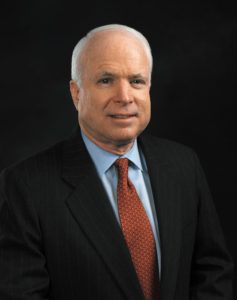 1982, McCain was elected to the U.S. House of Representatives, where he served two terms. He was first elected to the U.S. Senate in 1986 and easily won re-election five times, most recently in 2016. He has generally been considered a conservative, but has often taken on the GOP on certain issues and voted opposite from the conservative side of the Party. For the past 15 years, McCain has notably moved away from the Republican Party platform and seems to take pride in the nickname of “maverick.” As a member of the far-left Republican Main Street Partnership, he embodies the group’s unstated mission statement of destroying conservatives within the Republican Party. Is he a Conservative?
1982, McCain was elected to the U.S. House of Representatives, where he served two terms. He was first elected to the U.S. Senate in 1986 and easily won re-election five times, most recently in 2016. He has generally been considered a conservative, but has often taken on the GOP on certain issues and voted opposite from the conservative side of the Party. For the past 15 years, McCain has notably moved away from the Republican Party platform and seems to take pride in the nickname of “maverick.” As a member of the far-left Republican Main Street Partnership, he embodies the group’s unstated mission statement of destroying conservatives within the Republican Party. Is he a Conservative?
• McCain is the lead author of the bill to regulate modern campaign finances (McCain-Feingold), a move that was universally condemned by conservatives as unconstitutional and tendentious to incumbent politicians.
• He has also been the leading voice within the Republican Party for open borders and amnesty for illegal aliens.
• He opposed the 2001 and 2003 Bush tax cuts, and is widely blamed for watering down the cuts and forcing sunset provisions that have caused some of the tax rates to expire.
• As a member of the Commerce Committee, McCain pushed for global warming and cap-and-trade style regulations on energy output, in addition to opposing some proposals to drill for oil.
• He has also been more open to federal mandates and regulations on private industry and weak on certain liberty issues.
• His advocacy of limiting campaign contributions and regulating tobacco shows a penchant for using robust federal powers and big government to limit freedom.
Mitch McConnell (R-KY) Senator Mitch McConnell has been involved in politics since the 1960s; He has served in various political positions and elected offices since college. McConnell was elected to the Senate in 1984, and was elected to his sixth term in 2014. From 2003-2007 he 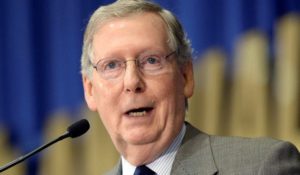 served as the Republican Whip. He has been the Republican Leader of the Senate since 2007. While quietly voting with conservatives throughout his career on issues related to life, guns (although he has taken a number of bad votes), and most tax issues, McConnell has failed to lead for conservatives on most critical issues during his time in leadership. In the few instances where he has publicly or privately spearheaded an initiative, it was for some of the most unpopular causes with conservatives, such as the Wall Street bailout, fiscal cliff tax increases, and debt ceiling increases. McConnell occasionally votes conservatively, but he has never used his leadership position to lead the Republicans against questionable policies, such as amnesty for illegal aliens, the war in Syria, and large spending bills. The only time McConnell has significantly led a conservative fight was in the battle against McCain-Feingold and other efforts to limit free speech. He has been active recently in fighting against the Obama administration’s war against coal, but only because it impacts his home state of Kentucky.
served as the Republican Whip. He has been the Republican Leader of the Senate since 2007. While quietly voting with conservatives throughout his career on issues related to life, guns (although he has taken a number of bad votes), and most tax issues, McConnell has failed to lead for conservatives on most critical issues during his time in leadership. In the few instances where he has publicly or privately spearheaded an initiative, it was for some of the most unpopular causes with conservatives, such as the Wall Street bailout, fiscal cliff tax increases, and debt ceiling increases. McConnell occasionally votes conservatively, but he has never used his leadership position to lead the Republicans against questionable policies, such as amnesty for illegal aliens, the war in Syria, and large spending bills. The only time McConnell has significantly led a conservative fight was in the battle against McCain-Feingold and other efforts to limit free speech. He has been active recently in fighting against the Obama administration’s war against coal, but only because it impacts his home state of Kentucky.
Lindsey Graham (R-SC) Another military veteran, Senator Lindsey Graham has served in both the Air Force and Air National Guard, and served as an officer in the JAG Corps. He still serves in the Air Force Reserves. His political career began with one term in the South Carolina House of Representatives from 1993-1995. He was elected to the U.S. House of Representatives in 1995, and served as a Congressman until 2002, when he was elected to the U.S. Senate. Graham was elected to a third term as Senator in 2014. He currently serves on the Appropriations, Armed Services, Budget, and Judiciary committees.
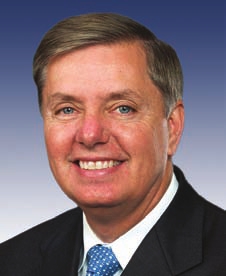 Graham was seen as a fairly conservative politician at the start of his career. That has changed, however, since he entered the Senate. For example, the Senator has voted for all of the bailouts, supports federal involvement in financial services and housing, and has even suggested that the federal government should take over banks. In addition to all this, he has voiced support to raise taxes to balance the budget. Senator Graham seems to like taxes and is one of the lead supporters of the Internet sales tax proposal. Serving on the Judiciary Committee, Graham has helped push many liberal judges through the judicial nomination process, including two Obama Supreme Court nominees, Sonia Sotomayor and Elena Kagan. Graham has also worked with Democrat Senator Chuck Schumer to constantly bring up immigration legislation. He has also been one of the strongest advocates for open borders and amnesty for illegal aliens.
Graham was seen as a fairly conservative politician at the start of his career. That has changed, however, since he entered the Senate. For example, the Senator has voted for all of the bailouts, supports federal involvement in financial services and housing, and has even suggested that the federal government should take over banks. In addition to all this, he has voiced support to raise taxes to balance the budget. Senator Graham seems to like taxes and is one of the lead supporters of the Internet sales tax proposal. Serving on the Judiciary Committee, Graham has helped push many liberal judges through the judicial nomination process, including two Obama Supreme Court nominees, Sonia Sotomayor and Elena Kagan. Graham has also worked with Democrat Senator Chuck Schumer to constantly bring up immigration legislation. He has also been one of the strongest advocates for open borders and amnesty for illegal aliens.
Orrin Hatch (R-UT) The only elected office Orrin Hatch has ever held is his seat in the U.S. Senator, which he won in 1977. However, he has been active in politics for over 35 years and, prior to political life, he was a lawyer. Ironically, Senator Hatch ran his first 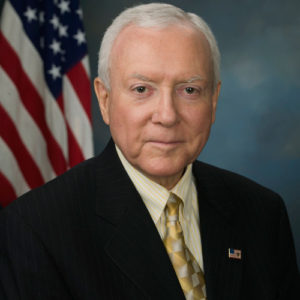 campaign in Utah by claiming that his opponent had been in Washington too long and had lost touch with his constituents. Over 35 years later he has appeared to have suffered the same fate. Recognized as a well-practiced career politician, Senator Hatch’s voting record has shifted away from the right over the years and he has become a solidly centrist/left leaning “establishment” Republican, and especially leaning to the left on social issues It wasn’t always that way.
campaign in Utah by claiming that his opponent had been in Washington too long and had lost touch with his constituents. Over 35 years later he has appeared to have suffered the same fate. Recognized as a well-practiced career politician, Senator Hatch’s voting record has shifted away from the right over the years and he has become a solidly centrist/left leaning “establishment” Republican, and especially leaning to the left on social issues It wasn’t always that way.
He was elected to the U.S. Senate as a conservative “culture warrior.” It seems that Senator Hatch quickly learned his way around Washington and began to engage in complex deal-making instead of advancing a conservative agenda. For example, he voted for the creation of the Department of Education and has advocated federal intervention in education while on the HELP Committee. As a member of the Judiciary Committee, Hatch has done little to oppose the liberal nominees of the Obama administration. On the Finance Committee, Hatch has a long record of supporting tax pork for green energy and has been a passionate supporter of earmarks, especially those that benefit his state.
When it comes to illegal immigration, he has been one of the strongest voices for amnesty, having served as the critical vote for the Gang of 8 amnesty bill both in committee and on the Senate floor. Senator Hatch was also an early supporter of the DREAM Act and for agriculture jobs bills. These legislative actions have become the basis of the current Democrat immigration agenda.
Roy Blunt (R-MO) Blunt was elected to the U.S. Senate in 2011 and currently sits on the Appropriations Committee, Commerce, Science, and Transportation Committee, and the Rules and Administration Committee. He was formerly the Republican Whip in the U.S. House of 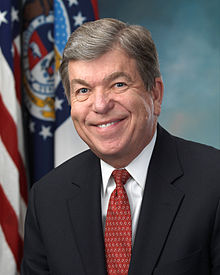 Representatives as well as the Majority Leader for a brief time. He was also elected to Senate Republican leadership as Republican Vice Chair for the 113th Congress.
Representatives as well as the Majority Leader for a brief time. He was also elected to Senate Republican leadership as Republican Vice Chair for the 113th Congress.
Blunt was described in a November 2010 Wall Street Journal article: “He was the right-hand man to former Majority Leader Tom DeLay and in his own right a powerful dispenser of patronage and influence… He was an effective whip. To others, he epitomizes the transactional K Street politician who uses the prerogatives of office to protect incumbents—hence the nickname ‘Mr. Earmark.’”
• As a member of the Senate Appropriations Committee, he has consistently voted with the bipartisan group of senators approving higher spending levels.
• As the lead Republican on the Surface Transportation Subcommittee, he has opposed devolving transportation to the states.
• As the lead Republican on the Agriculture Subcommittee of the Appropriations Committee, he has strongly supported agriculture subsidies, green energy subsidies, and earmarks.
What does all this Mean?
What this all means is that the Senate is really NOT Republican controlled. It also means that American voters that last November sent John McCain and others to Washington to fulfill the promises they during their campaigns are NOT getting what they expected from these Senators. Voters sent them there with one message: “Support the Trump agenda.” These Senators not only have not supported the President, on multiple occasions have actually campaigned AGAINST Trump agenda items. Who can forget this picture:
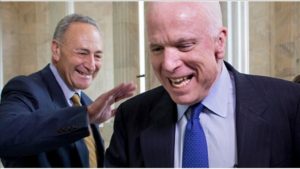 This picture is from the floor of the Senate the evening when the Senate vote was taken for the passage of what was called “the skinny Repeal of Obamacare.” This picture shows John McCain on his way to the Senate floor to cast the deciding vote to kill the bill. And he did so immediately after a meeting with Senate Minority Leader Chuck Schumer (D-NY). McCain went back to his desk and sat after casting his “no” vote. He eventually made his way to the Democrats’ side of the chamber and was greeted with hugs and cheers.
This picture is from the floor of the Senate the evening when the Senate vote was taken for the passage of what was called “the skinny Repeal of Obamacare.” This picture shows John McCain on his way to the Senate floor to cast the deciding vote to kill the bill. And he did so immediately after a meeting with Senate Minority Leader Chuck Schumer (D-NY). McCain went back to his desk and sat after casting his “no” vote. He eventually made his way to the Democrats’ side of the chamber and was greeted with hugs and cheers.
In casting that no vote, McCain illustrated my point here: even though Senators who are registered Republicans and who ran for office as Republicans, they are all NOT Republicans in legislating. Every GOP Senator campaigned promising to repeal and replace Obamacare, including McCain as did the other two who voted “No” on the bill with McCain: Susan Collins of Maine and Lisa Murkowski of Alaska.
Summary
Allow me to speak editorially here: President Trump in all of the outlandish allegations he makes against many different groups and people is NOT simply screaming in anger. In each he has an objective. “Fake Media:” his primary reasons for repeatedly calling out specific members of the media are to illustrate with specific examples just how untruthful the liberal media often are. Secondly, every time he makes that charge, those in the media go crazy and spend large amounts of broadcast time and newsprint inches retaliating, responding, creating excuses for the specific instances he brings up about their fake reporting. In doing this, he keeps the media so busy complaining about him and his “un-Presidential” actions that they miss the real purposes of his tweets about them: to divert their attention away from actual news.
Remember this advice: “Never let your right hand know what your left hand is doing?” That is precisely part of his tweet-war reasoning. Who can fault him? It certainly has worked!
I am right now sitting on the edge of my seat to watch and hear what he will say and do next. Being a part of the “Trump Era” is to me just like reading chapters of a Tom Clancy mystery novel as Clancy is writing them. What chapter will Trump write next?
One thing for certain: as he calls out RINO Republican Senators going forward, (which he will certainly do — again and again and again…) he has/will have a purpose: to expose the liberal bias they have while also showing Americans how blatantly each has ignored their campaign promises to their constituents. In doing so, you can bet conservative Americans will get the message. You can expect to experience a ground swell of anger and disdain for these lawmakers to result in wholesale change in the Senate.
That cannot come soon enough for me.


Excellent, if you’re republican vote republican if not vote them out. Thank you for your efforts!